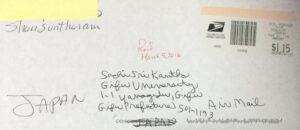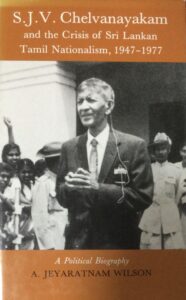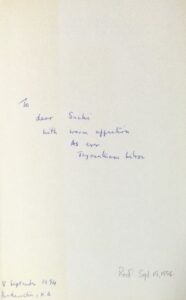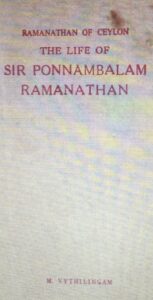by Sachi Sri Kantha, March 25, 2022
Table – Select List of Eelam Tamil Biographies in English
Having been an honorary columnist to the Sangam site for over the past 20 years, in frequently I do receive fan mail (mostly by email, but rarely by postal mail). Most are appreciative, but a few are pungent and critical of my expressed views.
Eight years ago, I received an appreciative air mail (dated February 13, 2014) from an Eelam Tamil, settled in the USA. I provide excerpts of this, for today’s commentary. The writer identified himself as Shan Suntharam.
“Dear Sachi,
Whatever the literary accomplishments of our Tamil forbears, which were considerable, history or chronicling was not their forte. The later, epigonic, generations, understandably, had no history worthwhile writing about. As most Saivites believe that to be born is an anathema and that the purpose of the religious life is to extinguish the ego, writing a memoir, I presume, would have been considered an undesirable literary project. But whatever the reason, we did not produce a Herodotus, Fa Hsien, Spengler or a Toynbee.
One cannot stress too much the importance of keeping records and constantly interpreting and commenting on events past and current. That is why I am grateful and appreciative of your endeavors as is evidenced in your columns in the Thamil Sangam net pages. I read your articles whenever I can and I am writing on behalf of the Tamils and on my own behalf to thank you and at the same time encourage you to persevere.

Envelope cover from a fan’s mail, received Mar 5, 2014
I am, like you, an émigré. I left Ceylon (yes, it was Ceylon when I left that island) in 1958 to qualify as a British Chartered accountant which was then prestigious, simply because it was a financially rewarding profession in Ceylon. After the 1958 riots by the Sinhalese, first of the pogroms, I decided not to return there to live. In retrospect it was, evidently, a wise decision….”
What my correspondent mentioned in his 2014 letter was true indeed. Recently, I checked the available biographies (either in a book format of minimum 50 pages, or in equivalent number of pages in digital version) on Eelam Tamils in English, from the authentic H.A.I. Goonetileke’s 5 volume collection of ‘Bibliography of Ceylon’ and in my personal library. I could come up with only 12 items. Biographies are available for only 9 individuals: Sir Mutu Coomaraswamy (1834-1879), Sir Pon Ramanathan (1851-1930), V. Kanagasabai Pillai (1855-1906), K. Balasingham (1876-1952), S.J.V. Chelvanayagam (1897-1977), S. Thondaman Sr. (1913-1999), A. Amirthalingam (1927-1989), Lakshman Kadirgamar (1933-2005) and V. Prabhakaran (1954-2009). If this is an under-count, I wish to be corrected. I provide a summary in Table 1 (see, pdf format). And the number of biographers are also 9, including me.

S.J.V. Chelvanayakam biography by Prof. A Jeyaratnam Wilson
While M. Vythilingam (1910 – ?) had authored a two volume biography on Sir Pon. Ramanathan, the honor for authoring three biographies (Thondaman Sr., Amirthalingam and Prabhakaran) goes to journalist Thambyaiah Sabaratnam (1932-2011).
[https://www.sangam.org/2011/03/TSabaratnam_Obituary.php?uid=4278]. Having authored a 641 page biography on Prabhakaran and currently serializing a lengthiest English biography on MGR, with modesty, I can claim the second place.
I do know that Prof. Ratnajeevan Hoole had published a couple of old-fashioned (akin to 19th century era) anti-Hindu polemical tracts on Arumuga Navalar (1822-1879) and C.W. Thamotharampillai (1832-1901). These I hesitate to recognize as biographies, due to their overt bias of extolling the glories of his ancestor, who shifted his religious affiliation from Hinduism to Christianity in the middle of the 19th century, for specific reasons known only to him (and not Prof. Hoole). For decades, Prof. Hoole’s gripe has been that his ancestor Rev. Fr. Elijah Parithithurai Sittampalam Seeni Hoole (1829-1881) deserves his due and recognition for preparing the Tamil version of Bible and NOT Arumuga Navalar. His gripes has been answered in the lines, ‘Thou hypocrite, first cast out the beam out of thine own eye; and then shalt thou see clearly to cast out the mote out of thy brother’s eye.’ [Matthew 7:3-5] It would be more welcome, if Prof. Hoole writes a biography of his ancestor, rather than griping on Navalar’s activities.
During my stay in Philadelphia, I was influenced by a commentary ‘Choosing a Life’ by biographer James Atlas (1949-2019), that appeared in the New York Times Book Review, of Jan. 13, 1991. This feature first kindled my interest in writing biographies. Five specific themes stressed by James Atlas serve as guide posts for my biography writing. These are as follows:
“Biography requires a certain reticence. The biographer’s job is to stay in the background, behind the scenes – like Flaubert’s ideal narrator, ‘everywhere present and nowhere visible.’ But of course the biographer is visible – in the selection of letters, documents and testimony from which he fashions his narrative; in his organization of this data; in the interpretation he puts on it; above all, in whom he chooses to write about.”
“Biographers are invariably drawn to the writing of a biography out of some deep personal motive.”
“Biography is a strange process, like getting married,’ says Justin Kaplan; but if things don’t work out, it’s better to separate than to stay together unhappily. The field is strewn with biographers who turned against their subjects.
“The biographer doesn’t have to like his subject; he has to be ‘possessed,’ as Richard Holmes puts it in the preface to his biography of Shelley. The intimacy that develops between subject and biographer is like no other; it’s a collaboration between two sensibilities bent on defying the sentence of oblivion imposed on us all.”
“As an act of remembrance, biography accomplishes what other, more transient forms of memorial never can: the preservation of a vanished life. It endures as a monument to the tenacity of the biographer – burrowing, gathering, digging, retrieving – and to the infinite complexity of the subject. By dwelling on a single existence, biography illustrates our human variety.”
I do agree with the observation that biography writing is ‘like getting married’. Day and night, I had to ‘live’ with my biographical subjects, while awake and also in sleep. By this yardstick, I had lived with Prabhakaran for five years (2001-2005). Now I have been living with cine actor turned politician MGR (since 2012) for almost 10 years! MGR is an exception to the collection I had assembled here. Though he don’t have Eelam pedigree, he was born in Ceylon, and during his final four years, came to exert strong influence on the plight of the Eelam folks.

Prof. A. Jeyaratnam Wilson’s inscription to me, dated Sept 8, 1994
The second influence in my passion to write biographies, other than the commentary by James Atlas, was a complimentary biography book sent to me by Prof. A. Jeyaratnam Wilson (1928-2000), in 1994. His inscription in it was an unexpected ‘push in the back’ for me, to dip my legs into the biography writing of Tamils. I was 41 then. At that time, I was busy with the compilation of my ‘An Einstein Dictionary’ (published by the Greenwood Press, 1996). I had received the book contract in 1991. As there have been already more than 50 biographies on Einstein, and Greenwood Press specialized in publishing reference books for academics and university students, for a variation, I opted to write an Einstein biography in a dictionary format, with over 600 entries. Being illiterate in German language was a handicap to me to read Einstein in original. Then, I was keen on writing a biography of American chemist Harold Urey (1893-1981), the 1934 Nobel prize laureate in chemistry. The reasons for this were: (1) First and foremost, I received a reply from him in 1976, for my fan letter. I was so impressed by his character in sending a reply to a youngster living in Colombo. (2) Urey was also a colleague of Einstein, and there was only one published biography on him at that time. (3) I was attracted by Urey’s multi-disciplinary publications. Unfortunately, I had moved to Japan in 1991, and for multiple reasons, couldn’t carry out my searches on Urey’s collections held in different American universities. These factors subsequently influenced me to turn my direction in attempting biographies on Tamil subjects, from 2000 onwards.
James Atlas concluded his 1991 commentary as follows: ‘It all depends on finding the right subject, the one that induces biographical obsession. How do you know when you’re on the right track? ‘You just know,’ says Mr. Holmes. ‘A good poet is someone who manages, in a lifetime of standing out in thunderstorms, to be struck by lightning five or six times.’…A good biographer manages to be struck once; twice or three times and he’s blessed.’
Richard Holmes (b. 1945) mentioned above is the British biographer of poet Shelley. Having shared my life time with the exploits of three great persons, I consider myself as blessed too.
A select list of Tamil biographers and their works
I focus mainly on the works of Eelam authors, excluding one Indian author M.R. Narayan Swamy.
Candappa C.V. The hon’ble Mr. K. Balasingham, Member of the Executive Council and the Legislative Council. Some contemporary comments and notes on his political activities. Parts I & II, Colombo, H.W.Cave & Co, printers, n.d.[19–]. 64 pp.
Durairajasingham S. The Life and writings of Sir Mutu Coomaraswamy, with a foreword by Dr. Rama Ponnampalam Coomaraswamy, and an introduction by Dr. E.F.C. Ludowyk, Selangor, Malaysia, 1973, 125 pp
Hoole SRH. A study in Tamil biographies – Thamotharampillai and Navalar. Pravada (Colombo), Dec 1994; 3 (nos. 8 and 9): 40-44.
Hoole SRH. C.W. Thamotharampillai, Tamil revivalist: The man behind the legend of Tamil nationalism. A lecture of Nov. 17, 1997, International Centre for Ethnic Studies, Colombo, 80 pp.
Jayaratnam Wilson A. S.J.V. Chelvanayakam and the crisis of Sri Lankan Tamil Nationalism 1947-1977: a political biography, Hurst & Co, London, 1994, 149 pp.
Kadirgamar A. The Cake that was baked at home Lakshman Kadirgamar – snapshots of the man’s life and times by his daughter, Vijitha Publications, Colombo, 2015, 521 pp.
Narayan Swamy M. R. Inside an Elusive Mind – Prabhakaran, Vijitha Publications, 2003, 290 pp.
Sabaratnam T. Out of Bondage: The Thondaman Story, The Sri Lanka Indian Community Council, Colombo, 1990, 250 pp.
Sabaratnam T. The Murder of a Moderate: Political biography of Appapillai Amirthalingam, Nivetha Publishers, Dehiwela, 1996, 426 pp.
Sabaratnam T. Pirapaharan, vol. 1 (195-1983) and 2 (1983-1986). https://sangam.org/pirapaharan-volume-1-and-2-by-t-sabaratnam-reposted/
Sivasambu R. Life and Times of V. Kanagasabai Pillai of Mallakam, Tribune Publications, Colombo, 1970, 63 pp.
Sri Kantha S. Pirabhakaran Phenomenon. Lively COMET Imprint, Gifu City, Japan, 2005, 641 pp.
Sri Kantha S. Minimum Guarantee Ramachandran: A Life in Cinema and Politics, Feb 2016, doi: 10.13140/RG.2.1.1703.7847. posted in Research Gate. First 32 chapters. https://www.researchgate.net/publication/292502450_Minimum_Guarantee_Ramachandran_A_Life_in_Cinema_and_Politics
Vythilingam M. The Life of Sir Ponnambalam Ramanathan, vol.1, Ramanathan Commermoration Society, Colombo, 1971, 605 pp.
Vythilingam M. Ramanathan of Ceylon. The Life of Sir Ponnambalam Ramanathan, vol. 2 (1910-1930), Thirumakal Press, Chunnakam, 1977, 758 pp.
*****
